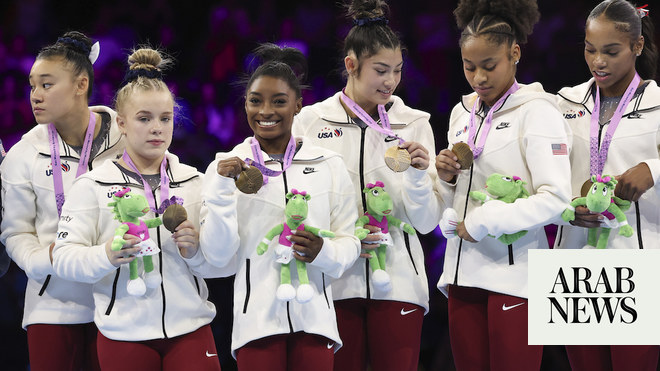
Simone Biles has given us many groundbreaking performances. This week she has pushed the boundaries of sport once more. Not by expanding her already extraordinary technical expertise as a gymnast but by challenging the persistent, macho narrative around what Olympic success and sporting strength should look like.
Biles follows tennis players Naomi Osaka at the French Open and Emma Raducanu at Wimbledon, who are unafraid to speak up in the global spotlight and place mental heath on the same level as physical health. Sadly, all have had their integrity, sporting prowess and character questioned. Michael Phelps revealed the extraordinary pressures and mental health struggles that he faced in a recent documentary called The Weight of Gold: the title says it all. Amid the stacks of gold medals and trophies, it’s hard to dismiss Phelps, Osaka or Biles as “weak losers” (unless you’re a certain brand of tabloid commentator). That means we have to think again. Surely we have had enough warning shots to realise the scale of the mental health crisis in sport – one that is also a mirror for wider society. It’s going to take more than a few extra wellbeing advisers to address the issue.
Traditional sporting narratives have for decades centred on physical and mental toughness, soldiering on regardless, a stiff upper lip at all times. We have no end of sporting heroes who exemplified these behaviours. The language is amplified by the media, dramatised by Hollywood and exploited by the world of sponsorship and advertising. But it’s out of date and out of touch with what research shows is required for sustained high performance and wellbeing. Biles confronted that myth head-on when she said at a press conference that she chose the “stronger” route of stepping back from competition, rather than simply “battling on”.
While I was researching the idea of winning as I was writing my book, The Long Win, and making sense of my own experience of 10 years as an Olympic rower, I found countless successful athletes who felt empty, unfulfilled, even depressed after winning. Jonny Wilkinson has spoken out about his desperate quest for joy, chasing the next cap, the next medal, even winning the Rugby World Cup with England – but in his own words, “the joy never came”. Biles’s own story shows us the path from sporting joy to suffering. When winning doesn’t even seem to be working well for the winners, it must surely be time to reshape sport.
Sporting performance clearly requires physical and mental skills at the highest levels – so why do we still have a different reaction when performance is stopped by anxiety rather than a calf strain? Why do we think it’s right to “push through” one, but not the other? These attitudes show the levels of bias, misunderstanding and poor education about mental health that still prevail – a worrying situation if you consider the mental health crisis that so many in sport and beyond have experienced as a result of experiencing long periods of isolation and lockdown.
When you hear former professionals, coaches, pundits or fans say that athletes such as Biles and Osaka should merely toughen up, it reveals more about themselves and the worlds that they were forced to survive. But Biles and a new generation of athletes want change. If sport is to thrive in the future, it needs to move beyond the tired, macho cliches and the sinister cultures that persist. The go-to defence in this primitive, last-man-standing, win-at-all-costs culture is to proclaim the “universal truth” that high performance sport is hard and ruthless. This only maintains the status quo, suggesting it is beyond challenge or improvement (never a good performance approach). Worst of all, it bolsters the idea that mental wellbeing is just one of the things you have to be tough enough to sacrifice if you’re a real “winner”. This only guarantees a continued spiral of increasing mental health issues, shortened careers and, self-defeatingly, holds back performance too. It does little to attract newcomers to sport either.
Research has shown that one of the reasons that Olympic heroes haven’t contributed to improved participation in sport is because audiences feel they can’t relate to them or begin to imagine emulating them. A recent UKActive study showed that the best sporting role models for children were teachers, not Team GB athletes. Perhaps if Olympians were allowed to show their human side, and celebrated not solely through the narrow measure of whether they win a medal or not (which depends on so many external factors anyway), then there could be greater enjoyment and inspiration from sport, for both competitors and spectators.
I can remember the early years of my Olympic rowing career when coaches talked only of who had the “will to win”, who was toughest and most willing to put up with anything a coach threw at you without complaint. It was an environment in which you tried to survive, but could never thrive. Some teammates, coaches and managers would ignore you or talk differently to you if you’d lost a race. It was hard to resist feeling that your identity was defined by your results. But that was a recipe for diminishing self-worth, and with it, decreased performance. It was only after a break from rowing (when I joined the Foreign Office), that a renewed perspective enabled me to realise that sport didn’t define me. At that point, I returned to rowing and had my most successful period, winning a world championship and an Olympic silver at the 2004 games in Athens. But more than that, I had found a different mindset and fresh approach to the pursuit of sporting excellence.
Despite all her incredible previous achievements, Biles’s greatest contribution could be pushing leaders across the sporting world to give Olympians space to find a purpose beyond a single moment on the podium. To feel pride in their best performance, even when it doesn’t go to plan. Athletes have extraordinary talents, but they shouldn’t derive their individual worth through such narrowly defined prisms. Redefining what success means, broadening the lens through which we watch sport, and changing the language we use, could allow the best of sport – constant innovation, connection across communities, a drive for excellence and the potential for personal growth – to come to the fore. These bring aspects of lasting value to athletes beyond the podium. We have an opportunity to stop and really listen to Biles, to reflect without leaping to judgment. High performance sport could start to become healthy.
Cath Bishop is an Olympic rower, former diplomat and author of The Long Win: The search for a better way to succeed. She is an adviser to The True Athlete Project












